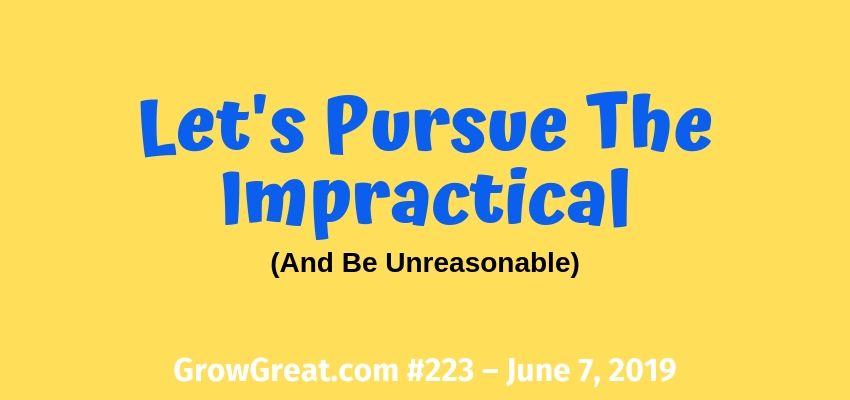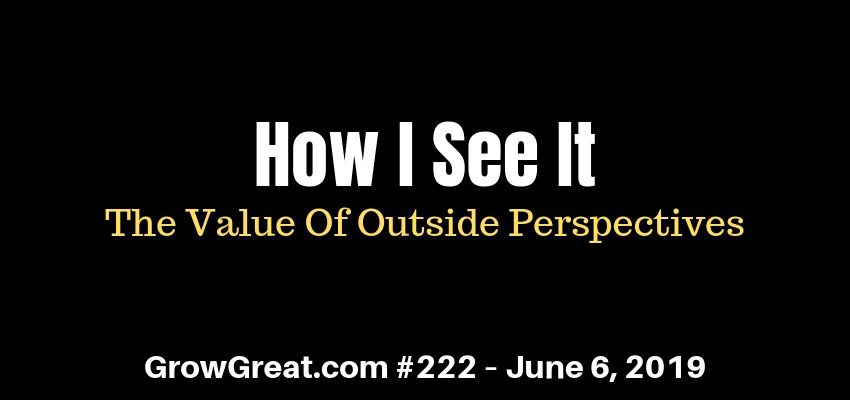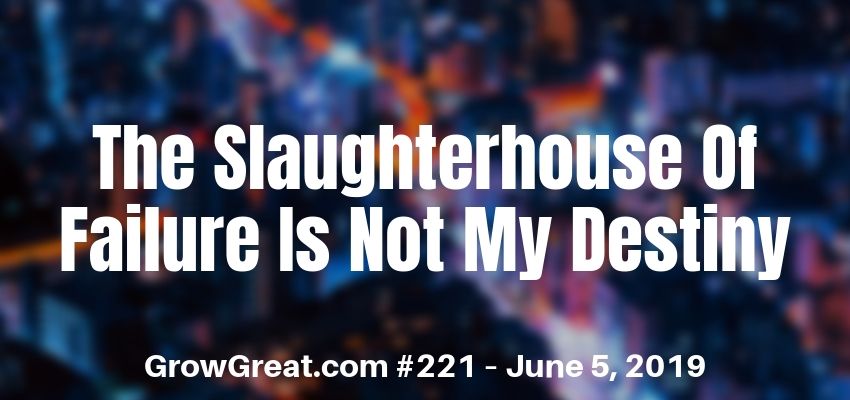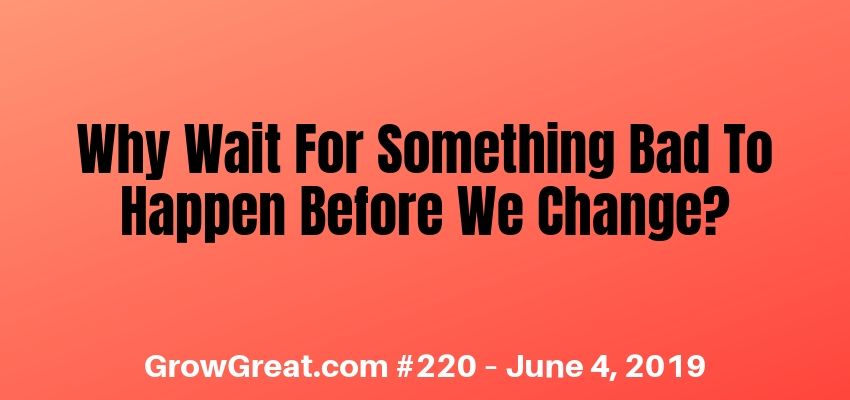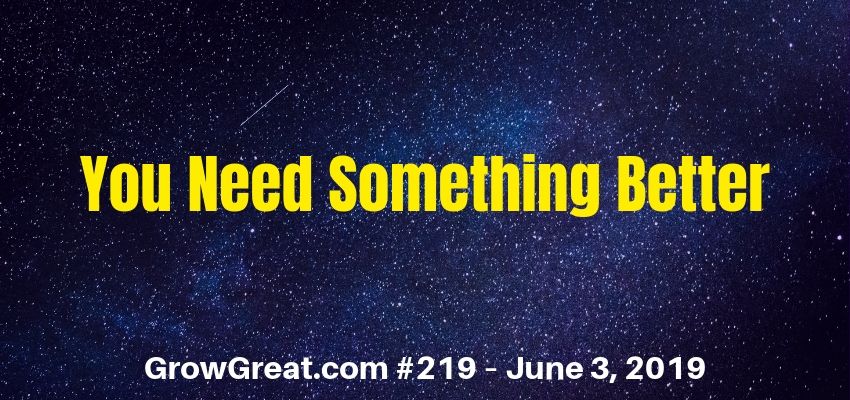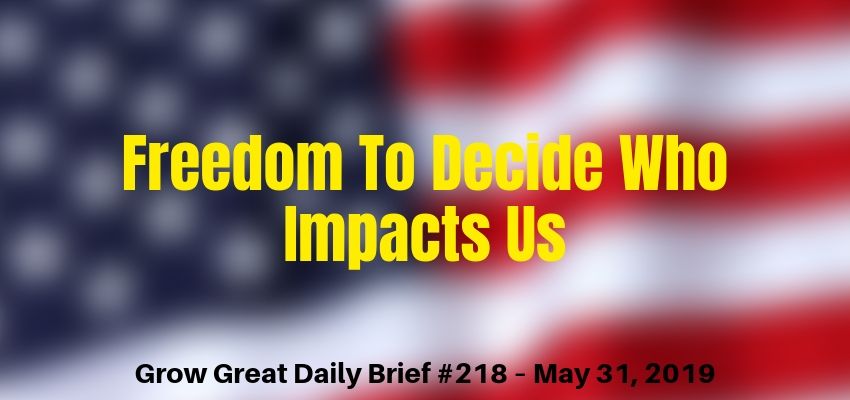Let’s Pursue The Impractical (And Be Unreasonable) – Grow Great Daily Brief #223 – June 7, 2019
Podcast: Play in new window | Download (Duration: 11:27 — 13.6MB)
Subscribe: Apple Podcasts | Spotify | RSS | More
I’m a practical person. And rather proud of it. But the strength can be a weakness when it’s deployed too much. Or in the wrong way. For instance, it can prevent me from thinking big enough. But it never prevents me from idealism – so I can be a walking contradiction much of the time. It makes me special. 😉
Idealism is the ongoing pursuit of the way things SHOULD be. The dictionary defines idealism this way:
the practice of forming or pursuing ideals, especially unrealistically
An idealist is a person who follows their ideals even to the point of impracticality.
This week we’ve talked a bit about beliefs and perspective, especially how we see things. It’s the Pogo cartoon line circa 1971, “We have met the enemy and he is us.”
Indeed we often are our worst enemy. Especially when it comes to dreaming big, thinking big, aiming high and pursuing the impractical.
I choose to end this week on a note of innovation, creativity and impossibility thinking. I’m bored with possibility thinking. And with practical. It’s much more fun to consider what’s impractical and what may be impossible.
I’m blessed with five grandkids who range in age from 12 (almost) to 4 (almost). Even the oldest is more ideal than practical. I’m curious when the idealism will give way to the practical. I know it’s coming because it comes for all of us.
The interesting thing is how easy impractical is for kids. They don’t know any better. What kid would have as much fun by being practical? There’s no fun in that.
I’m sure the adults in these kid’s lives will tell them that’s not how the real world works. We’ll send them other signals that will methodically squash their idealism. I’m sad about that, but I don’t know to fully prevent it. I can only hope to instill in them my encouragement to keep dreaming and thinking as big as they want.
It’s the Ying and Yang of being responsible (practical) while embracing a safe margin of dreaming (being impractical).
Cason is my almost 4-year-old grandson. I nicknamed him Road Rash Roy over 2 years ago because he’s adventurous and always had some scrape on his face. Road rash from a fall or something.
Roy was scaringly fearless the first couple of years of his life. He’s still pretty fearless, but he was afraid of water. Even after taking swimming lessons for two summers, he’s still not a big fan of getting in the pool. Such is the nature of fear. It is what it is. Who knows why?
I mention “Roy” because nothing in his life is based on practicality. Well, nothing I can think of. Roy’s whole life is the pursuit of the impractical.
He grabs a PlayStation game controller from an older cousin without any idea what to do. When the older kids try to show him what to do, he’s completely uninterested. He’ll jerk away from them, controller in a death grip, and declare, “I can do it.” Nevermind that he can’t. He doesn’t care what you or anybody thinks. The kid is stubborn and determined. Best to leave him alone and let him figure it out.
Seconds go by and he’s frustrated out of his mind. He’ll carry on unleashing his frustration. But you can’t help him ’cause he won’t let you. He’s completely unreasonable. 😀
We grow up (and out of) being unreasonable. But we tend to do it across all areas of our life. And it stifles our creativity, innovation, and dreams. I don’t want Roy to stop dreaming. Or to stop dreaming big.
In 2007 author Paul Lemberg wrote a book entitled, Be Unreasonable: The Unconventional Way To Extraordinary Business Results. It’s been years since I read it but it still sits on my shelves. I admit I bought it when it came out because of the title. I’ve had a longtime fascination with impractical and unreasonable pursuits. 😉
Impractical and unreasonable are synonyms as I’m using them today. I don’t mean unreasonable in that it defies logic and reason when it comes to us behaving responsibility with the resources we’re managing. But it does defy the ordinary, conventional and typical.
Paul puts forth the notion that unreasonable is a must if you want to be extraordinary. Who can disagree? Ordinary is so reasonable it’s average. Well, at least ordinary.
Unreasonable ignores conventional wisdom. It’s doing more than you’re asked. It’s asking more than most are willing to give. It’s giving your best in every situation, even if your best isn’t required.
Unreasonable and impractical is about saying yes to yourself when everybody says no to your idea or pursuit. It’s acting on the prospect of greatness without fretting over whether it’ll work. Impractical and unreasonable increases the chances of success by helping possible things become a reality.
It’s also about making improbable but needed things to happen. Unreasonable and impractical question why things considered normal are normal. Then it figures out how to improve them.
Impractical is about expecting the best and success every time. It’s expecting greatness. Our own, our business and our ideas. It’s about questioning why and why not!
Weirdness is impractical. Unreasonable is impractical. So is creativity. And innovation. And improvement.
Let’s pursue the impractical because that’s where the biggest success is found. That’s where the fun is found.
Today is the day. The best day. To start thinking bigger. To start dreaming about what could be — all those things that seem impossible or improbable. Today is the day to start asking, “Why not?” And when people tell you your idea is impractical or unreasonble, today is the day to start tell them, “It doesn’t matter. I’m gonna pursue it anyway!”
Winners win. Go big! I’ve got an almost 4-year-old grandson who doesn’t yet know better. And it’s worked out terrifically well for him so far. Here’s a video of him when he was 2. This was 50% of his life ago!
Be well. Do good. Grow great!
Randy
